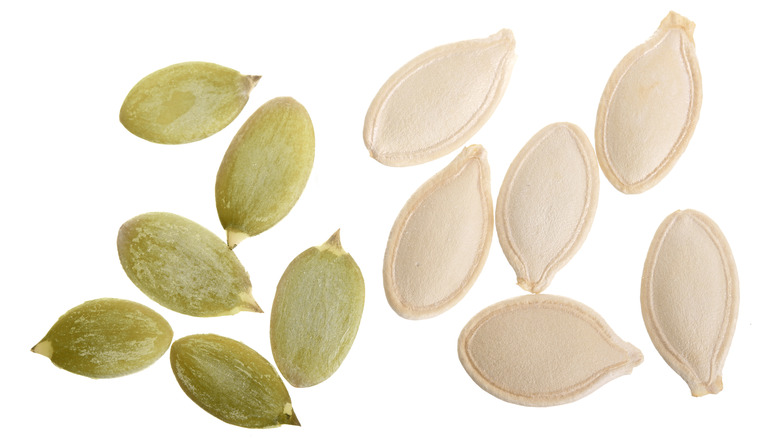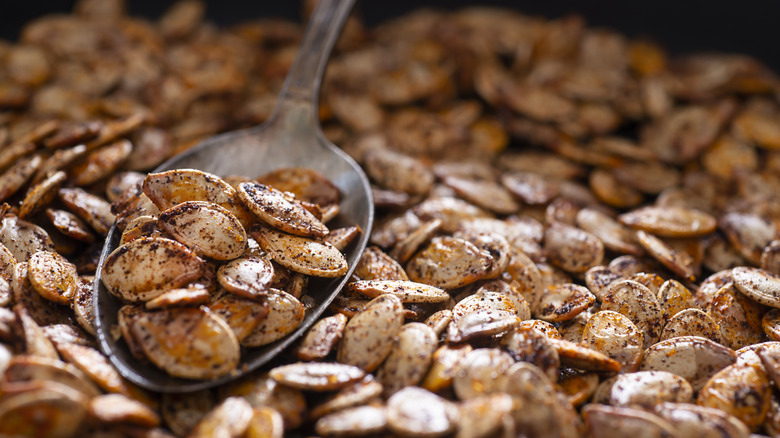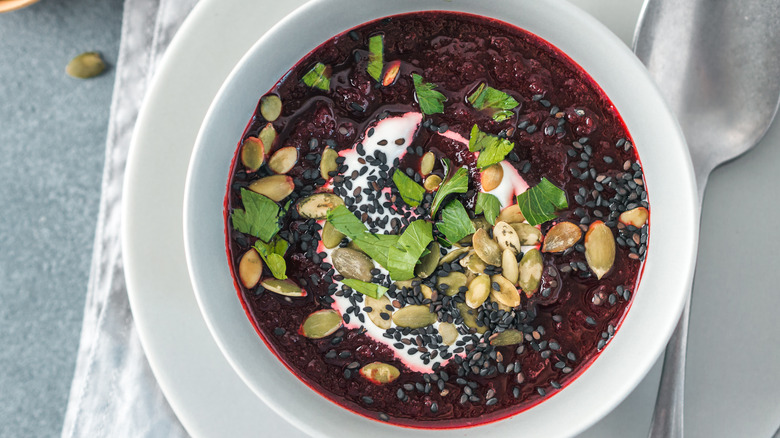The Subtle Difference That Sets Pumpkin Seeds And Pepitas Apart
If you've ever been told that pepitas are pumpkin seeds, only to be puzzled by the thick white seeds revealed when carving into your Halloween jack-o-lantern, you're not alone. But you also haven't been completely misled. Pumpkin seeds, like the kind you see in a jack-o-lantern, have a thick seed coat and need to be cooked before they're eaten. Pepitas, on the other hand, come from a variety of pumpkins known as Styrian or oilseed pumpkins, according to Dalhousie University. The seeds of these pumpkins are covered in a thin, transparent membrane rather than a thick white hull, and can be eaten raw.
The ancestors of pumpkins as we know them today were grown and cultivated in Mexico beginning almost 7,500 years ago. But modern pepitas are actually the result of a random genetic mutation that occurred in a pumpkin patch in Styria, Austria. A pumpkin produced seeds with a thin, nearly invisible seed coat, which were much easier to process into nutrient-rich and valuable pumpkin oil than hulled seeds. Over the years, the variety was selectively bred, until the first oilseed pumpkin with hull-free seeds was successfully developed in 1947. So how is it, then, that pepitas have been used for centuries longer than that in Mexican cooking? In Mexico, pepitas is a term that can refer to both hulled pumpkin seeds and seeds from Styrian pumpkin varieties. But in general, in the United States, when you see a bag of green seeds labeled pepitas, they're specifically the seeds of Styrian pumpkins.
How to cook with pumpkin seeds and pepitas
The biggest difference between pumpkin seeds and pepitas is that because of their thick seed hull, pumpkin seeds need to be cooked before they're consumed, unless you shell them first, which is a time-consuming process. That's why if you're purchasing pumpkin seeds from the store, they're usually sold already roasted. If you're trying to use pumpkin seeds from a fresh pumpkin, you'll want to rinse off any pumpkin goo from the seeds, then roast them. They can be roasted dry or with oil, and with or without added seasonings. In fact, one of the benefits of roasting pumpkin seeds from scratch is that many of the most popular store-bought roasted pumpkin seed brands contain a lot of sodium. Roasted shell-on pumpkin seeds are usually just enjoyed as a snack. The roasting process transforms the tough hull into a crispy treat, with a slightly sweet little seed inside.
Pepitas are more versatile than pumpkin seeds. They, too, can be eaten by the handful as a simple snack. They can also be used like any other nut or seed you might cook with. Add them to granola, oatmeal, breakfast bowls, and baked goods; use them to make traditional Mexican recipes like salsa macha or sikil pak, a Mayan tomato and pumpkin seed dip; or sprinkle them on salads and pastas. The options are pretty endless. Even better? Both pumpkin seeds and pepitas offer a bevy of nutritional value, too.
How healthy are pepitas and pumpkin seeds?
Like most nuts and seeds, pumpkin seeds and pepitas are loaded with beneficial nutrients, though you'll want to opt for low-sodium or sodium-free varieties for the healthiest options. Nutritionally, pumpkin seeds and pepitas are similar. They're both rich in magnesium, zinc, antioxidants, iron, and heart-healthy unsaturated fats. But thick-shelled pumpkin seeds have almost twice as much fiber. On the flip side, Healthline reports that people with some digestive conditions like irritable bowel disease might have their symptoms triggered by the shell of pumpkin seeds, so it's best for those individuals to limit how many they eat or avoid whole pumpkin seeds entirely. Shelled varieties like pepitas are the safer option, but some folks might benefit from avoiding these too.
The next time you're at the health food store or browsing recipes, don't get tripped up by confusing pumpkin seeds and pepitas. Remember that pumpkin seeds have a thick white hull and that pepitas are green and hull-less. If you're looking for a snack with a chew, then pumpkin seeds are for you, but if you're looking for something more versatile, then you need a pepita.


